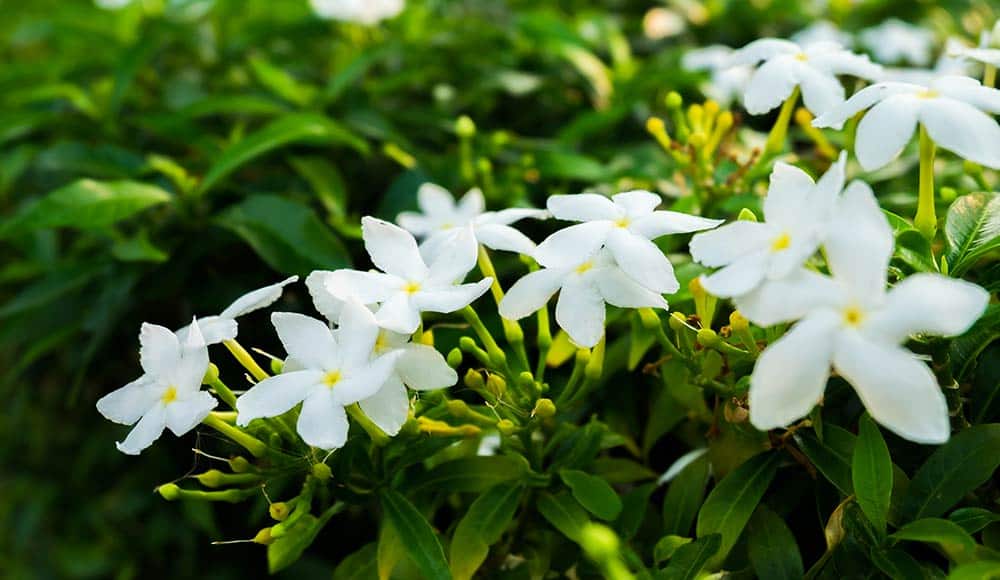Jasmine plants produce some of the brightest and beautiful flowers known to man.
Whether you are looking for a landscaping flower, an additional burst of color to your garden, or a houseplant, Jasmine will not disappoint. It will take your gardening and landscaping to the top.
The flower is famous for its white blossoms and unique tropical smell.
The fact that it can bloom throughout the year also makes it a convenient choice for many.
If you are hoping to grow jasmine and have a canine at home, you might want to take a step back.
How about arming yourself with some information about whether the pleasant flower is safe for your canine buddy?
That’s where we come in. We will tell you all the scoop about jasmine and its safety with dogs.
What is Jasmine?

These are tropical perennial flowers that do well in warm climates.
The plant Jasmine has bright green foliage that has a glossy appearance.
It is evergreen which means it maintains its green color all year long.
You probably know the scent of jasmine from your favorite soaps, candles, and teas.
Its distinct scent finds use in plenty of applications including beauty, interior décor, beverage, and more.
The plant has white flowers although some species produce cream or yellow blooms.
It can be grown in a yard, garden, container, or pot.
Either way, with moderately fertilized soil, sunlight (or partial shade), and water, this plant will grow and bloom beautifully.
Essentially, Jasmine is a family of 12 different varieties of flowers. All fall in the olive family.
They are mostly grown as vines but they can act as ground cover or shrubs as well.
Some of the common varieties include Arabian Jasmine, Purple Jasmine, White Jasmine, Forest Jasmine, Spanish Jasmine, and Winter Jasmine.
Is Jasmine Poisonous To Dogs?
According to the ASPCA, true Jasmine (Jasminum officinale) is non-toxic to dogs.
Whether your pet rolls around the flower or ingests any part of it, he will not suffer any ill effects.
As usual, you want to make sure he doesn’t eat a lot of it. Too much green matter may cause gastric upsets.
Your dog just doesn’t have a digestive system that can digest plant matter in huge amounts.
Jessamine Is Toxic To Dogs

While true jasmine is harmless to pets, jessamine is not.
See, jasmine is used wrongly by many people—gardeners and non -gardeners alike.
In fact, there are many other flowers and shrubs that are commonly mistaken to be jasmine—mostly as a mispronunciation of the genus name.
Jessamine is one of these plants—it is often mispronounced as jasmine. Others call it ‘false jasmine’.
The scientific name is Yellow/Carolina jasmine or Gelsemium sempervines.
Basically, this is a tropical vine that finds its roots in the Caribbean as well as Central America.
South Easterners also use it as a cover of stone walls and garden arbors.
Jessamine features yellow flowers with the shape of a trumpet which explains its nickname ‘trumpet’. It’s also commonly called ‘woodbine’ and ‘gelsemium’.
Colorado State University and Pet Poison Helpline both claim that this cute yellow flower is toxic to human beings and other mammals including dogs, cats, horses, and more.
The entire plant (the flowers, berries, and leaves) contain atropine alkaloids and the famous toxic substance glycoalkaloid solanine.
If your doggie ingests any part of the flower, he will suffer ill effects that may require medical intervention.
Another plant that is often confused with true jasmine is the star jasmine (Trachelospermum jasminoides).
Also called Confederate jasmine, this is a vine that often produces fragrant, bees-friendly white blossoms.
It is native to Japan and China but also goes well in the Southern US and California, where it is grown for its outstanding ground cover and twining decoration.
Is it toxic to dogs? No, the vine is non-toxic to dogs, cats, and horses according to ASPCA.
Jessamine Poisoning In Dogs

Jasmine poisoning in dogs ranges from muscle weakness, difficulty swallowing, paralysis, vision loss, breathing difficulty, decreased respiratory rate, and seizures. These are common with the yellow Jasmine.
Other varieties like the day-blooming and night-blooming types cause increased pulse, tremors, weight loss, decreased appetite, increased bone density, and hormone imbalances.
If you suspect that your dog has ingested true jasmine (or any plant in the Jasminum genus for that matter), call the vet immediately.
Grab the sample (if you can) and bring it with you to the vet or poison control center.
After diagnosis, the vet will find out the most effective treatment option.
For the most part, he will offer inflammatory drugs and intravenous fluids to counter the effects of the flower on the dog’s body.
As soon as the dog is stable, the vet will then induce vomiting to eliminate any material in the gut.
Parting Thoughts
Jasmine is a beloved shrub in many homes and institutions.
It is truly beautiful and sweet-smelling.
Its true form is dog-safe.
Unfortunately, jessamine is quite toxic to all mammals – you and your Fido included.
If you have some in your home already, consider eliminating them.
It’s only a matter of time before your pup plays with them and gets in trouble for it.
As an Amazon Associate, we may receive a small commission from qualifying purchases but at no extra cost to you. Learn more. Amazon and the Amazon logo are trademarks of Amazon.com, Inc, or its affiliates.

